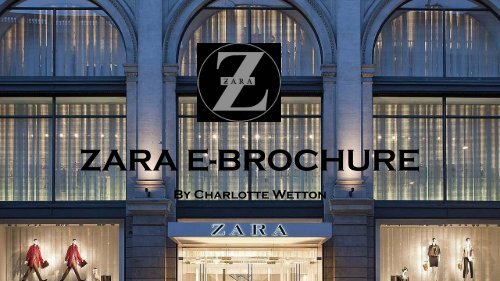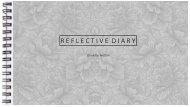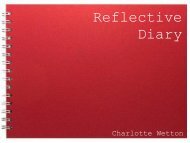You also want an ePaper? Increase the reach of your titles
YUMPU automatically turns print PDFs into web optimized ePapers that Google loves.
ZARA E-BROCHURE<br />
By Charlotte Wetton
Retail Buyer:<br />
Job roles and responsibilities:<br />
Throughout the year, your responsibilities will include:<br />
•Analysing consumer buying patterns and predicting future trends<br />
•Regularly reviewing performance indicators, such as sales and discount levels<br />
•Managing plans for stock levels<br />
•Reacting to changes in demand and logistics<br />
•Meeting suppliers and negotiating terms of contract<br />
•Maintaining relationships with existing suppliers and sourcing new suppliers for future<br />
products<br />
•Understanding the basic rules of vendor management, allocation and price negotiation<br />
•Liaising with other departments within the organisation to ensure projects are completed<br />
•Attending trade fairs, in the UK and overseas, to select and assemble a new collection of<br />
products<br />
•Participating in promotional activities<br />
•Writing reports and forecasting sales levels<br />
•Presenting new ranges to senior retail managers<br />
•Liaising with shop personnel to ensure supply meets demand<br />
•Getting feedback from customers<br />
•Training and mentoring junior staff.<br />
Entry requirements:<br />
Although this area of work is open to all graduates, a degree in retail or<br />
business can equip you with a greater commercial awareness and therefore<br />
increase your chances of getting a job. Graduate programmes are open to<br />
those with a 2:2 or above. In certain buying areas, such as fashion, employers<br />
may look for a relevant degree subject or a demonstrable interest and<br />
commitment to this particular area of retailing. Relevant HNDs and foundation<br />
degrees may be accepted by some employers, particularly if a candidate has<br />
practical experience to offer. It is sometimes possible to work your way up to a<br />
buying position without higher education qualifications. The level of<br />
competition is fierce, however, and there are few vacancies that offer direct<br />
entry into buying.<br />
Personal and professional characteristics:<br />
You will need to show evidence of the following:<br />
•Strong analytical skills<br />
•Negotiation skills and the ability to network and influence people<br />
•Team working and interpersonal skills<br />
•Excellent communication skills<br />
•Numeracy skills and proficiency using IT<br />
•Good organisation skills and the ability to multitask<br />
•The ability to cope with the pressure of having to make important decisions<br />
and meet tight deadlines<br />
•The capability to work in a fast-paced environment and achieve targets<br />
•Drive and determination<br />
•Entrepreneurial spirit and a willingness to take risks<br />
•Commercial awareness<br />
•Leadership attributes<br />
•Creative flair<br />
•Confident presentation style<br />
•A passion for retail.<br />
Salary:<br />
•Typical starting salaries for junior buying roles: £18,000 - £25,000.<br />
•Typical salaries for more experienced buyers: £35,000 - £60,000.<br />
•Typical salaries at senior level/with experience: £55,000 - £70,000 plus.<br />
•Salaries vary according to a number of factors, including location, the size of the<br />
business.
Fashion Designer:<br />
Job roles and responsibilities:<br />
Tasks depend on the market the designer is working for, but core responsibilities include:<br />
•Creating or visualising an idea and producing a design by hand or using computer-aided design<br />
(CAD)<br />
•Keeping up to date with emerging fashion trends as well as general trends relating to fabrics,<br />
colours and shapes<br />
•Planning and developing ranges<br />
•Working with others in the design team, such as buyers and forecasters, to develop products to<br />
meet a brief<br />
•Liaising closely with sales, buying and production teams on an ongoing basis to ensure the item<br />
suits the customer, market and price points<br />
•Understanding design from a technical perspective, i.e. producing patterns and technical<br />
specifications for designs<br />
•Sourcing, selecting and buying fabrics, trims, fastenings and embellishments<br />
•Adapting existing designs for mass production<br />
•Developing a pattern that is cut and sewn into sample garments and supervising the creation of<br />
these, including fitting, detailing and adaptations<br />
•Overseeing production<br />
•Negotiating with customers and suppliers<br />
•Managing marketing, finances and other business activities, if working on a self-employed basis.<br />
Salary:<br />
•Starting salaries in the fashion industry are often low. Design assistants may start<br />
at around £16,000 to £17,000<br />
•A junior designer can expect to earn approximately £25,000 a year<br />
•Typical salaries at senior designer and creative director level range from £42,000<br />
to £85,000+.<br />
Personal and professional characteristics:<br />
You will need to show:<br />
•Creativity, innovation and flair<br />
•An eye for colour and a feel for fabrics and materials<br />
•The ability to generate ideas and concepts<br />
•Design and visualisation skills, either by hand or through computer-aided<br />
design (CAD)<br />
•Technical skills, including pattern cutting<br />
•Garment technology skills and knowledge<br />
•A proactive approach<br />
•Commercial awareness and business orientation<br />
•Self-promotion and confidence<br />
•Interpersonal, communication and networking skills<br />
•The ability to negotiate and to influence others<br />
•Team working skills<br />
•Good organisation and time management.<br />
Entry requirements:<br />
Although this area of work is open to all graduates, a degree in the following<br />
subjects will increase your chances:<br />
•Art and design<br />
•Clothing technology<br />
•Fashion<br />
•Fashion marketing and buying<br />
•Graphic design<br />
•Knitwear<br />
•Textiles.<br />
Foundation degree graduates face increased competition from BA<br />
graduates.<br />
Entry without a degree is sometimes possible but is becoming increasingly<br />
unlikely and you would need to be able to prove that you have already<br />
gained expertise and experience in the industry.
Garment Technologist:<br />
Job roles and responsibilities:<br />
As a garment technologist you could be employed by a large high-street retailer, or<br />
garment manufacturer. Garment technologists support buying and design teams<br />
through all stages of product development, from design to manufacture. You will carry<br />
out a range of technical, investigative and quality control work to ensure the end<br />
product performs to specification. The job involves working in an office, but you must<br />
be willing to travel to meet supplier, customers and manufacturers. You will work<br />
closely with designers, graders, buyers and pattern cutters. The hours are usually<br />
around 38 hours a week, but over time may be needed to ensure collections are<br />
produced on time.<br />
Salary:<br />
•Starting salary: £16,000<br />
•Experienced salary: £25,000<br />
•Highly Experienced salary: £30,000 or more.<br />
Personal and professional characteristics:<br />
•Have an understanding of manufacturing, textiles and garment construction<br />
•Have the ability to work alone as well as in a team<br />
•Be able to work under tight deadlines and cope with pressure<br />
•Have a keen interest in fashion and textiles<br />
•Demonstrate an understanding of pattern cutting, construction and<br />
manufacturing techniques<br />
•Technical knowledge gained preferably within fast paced commercial or supplier<br />
environment<br />
•Flexible approach to be able to adjust to the constantly changing needs of the<br />
business.<br />
•Ability to convey technical information clearly in layman’s terms<br />
•Exceptional eye for technical detail to consistently ensure the correct<br />
documentation is used and followed<br />
•Applied technical knowledge of fabrics and threads<br />
•Highly organised with good prioritisation skills<br />
•Confident and clear communication skills; both verbal and written to work<br />
productively alongside other Product teams and external suppliers<br />
Entry requirements:<br />
There are no set requirements, but you’ll usually need an HND or degree in a relevant<br />
subject. Some courses combine garment and clothing technology with fashion design.<br />
•Paid or unpaid work experience could help you get a job<br />
•You could get into this job through an apprenticeship<br />
•Creative Skillset has more details about this career.
Marketing Manager:<br />
Job roles and responsibilities:<br />
•Interviews, hires, and trains marketing staff members<br />
•Establishes marketing goals based on past performance and market forecasts<br />
•Oversees current offerings and comes up with initiatives for new products or services<br />
•Researches and analyses market trends, demographics, pricing schedules, competitor products, and<br />
other relevant information to form marketing strategies<br />
•Works with marketing staff to develop detailed marketing plans for all media channels and sales teams<br />
•Approves and oversees the creative development of promotional materials, website content,<br />
advertisements, and other marketing-related projects<br />
•Communicates with various media buyers, advertising agencies, printers, and other services to help<br />
marketing projects come to fruition<br />
•Provides in-depth information to interested clients, and acts as a representative for the marketing<br />
department in important buyer meetings<br />
•Works within the department budget to develop cost-effective marketing plans for each product or<br />
service<br />
•Tracks all marketing and sales data and creates detailed written reports and verbal presentations to<br />
bring to senior executives<br />
•Adjusts marketing campaigns and strategies as needed in response to collected data and other<br />
feedback.<br />
Personal and professional characteristics:<br />
•Leadership and motivational skills<br />
•Creativity and great attention to detail<br />
•Excellent communication and IT skills<br />
•Budgeting and project management skills.<br />
Entry requirements:<br />
There are no set entry requirements. You'll usually need 3 to 5 years'<br />
experience as a marketing executive, sales manager or public relations<br />
officer.<br />
•You may need a degree in marketing or business, or a professional<br />
marketing qualification<br />
•Another option is to start as a junior marketing manager or marketing<br />
apprentice and work your way up.<br />
Salary:<br />
•Starting salary: £25,000 to £30,000<br />
•Experienced salary: £30,000 to £45,000<br />
•Highly Experienced salary: £55,000 or more.
Visual Merchandiser:<br />
Job roles and responsibilities:<br />
The type of activities undertaken will depend on the employer and level of seniority. Visual<br />
merchandisers working at higher levels can be based within head office teams, with regional teams, or<br />
at larger or flagship stores.<br />
Activities may include the following:<br />
•Liaising with teams such as buying, design and marketing to create design themes and plans, often<br />
months in advance, including window and in-store displays, signage and pricing concepts<br />
•Conducting research on current and future trends in design and lifestyle, and associated target market<br />
features<br />
•Meeting with business, sales managers and retail managers to discuss sales strategies<br />
•Identifying and sourcing props, fabrics, hardware and lighting<br />
•Maintaining a budget and negotiating with suppliers of visual materials<br />
•Working with architectural features of stores to maximise the available space<br />
•Using artistic skills or computer-aided design (CAD) packages, such as AutoCAD, Mockshop or Adobe<br />
Creative Suite, to create visuals and plans<br />
•Visiting branches to coach in-store visual merchandising or sales teams to interpret the guidelines and<br />
training them in the execution of the visual concept<br />
•Assembling or dismantling visual displays in windows or in-store<br />
•Leading and motivating teams to complete displays to tight deadlines.<br />
Salary:<br />
•Assistant visual merchandiser salaries will typically start at around £12,000 to £18,000 depending on<br />
experience and in-store or field function<br />
•Experienced or management roles can attract starting salaries of £20,000 to £27,000 with senior levels<br />
starting on around £30,000<br />
•Those working at director or international levels can earn between £45,000 and £60,000 per annum<br />
•Some field or regional roles may attract benefits such as a company car, fuel allowance and mobile<br />
phone.<br />
Personal and professional characteristics:<br />
You will need to show evidence of the following:<br />
•A talent for design, colour and style<br />
•Creative flair and imagination<br />
•Strong interest in current and future design trends<br />
•Visual/spatial awareness and manual dexterity<br />
•Effective communication and negotiation skills<br />
•Engaging and working well with a range of teams<br />
•Able to work with constructive criticism.<br />
Entry requirements:<br />
It is not essential to be a graduate to enter this profession, but some<br />
higher education institutions offer awards specific to the occupation.<br />
Some of these are available as a two-year foundation degree, with a<br />
top up year for a full Bachelor’s degree:<br />
•Fashion buying and merchandising at London College of Fashion<br />
•Visual merchandising and promotional design at Hugh Baird College in<br />
Liverpool<br />
•Visual merchandising at Hertford Regional College.










